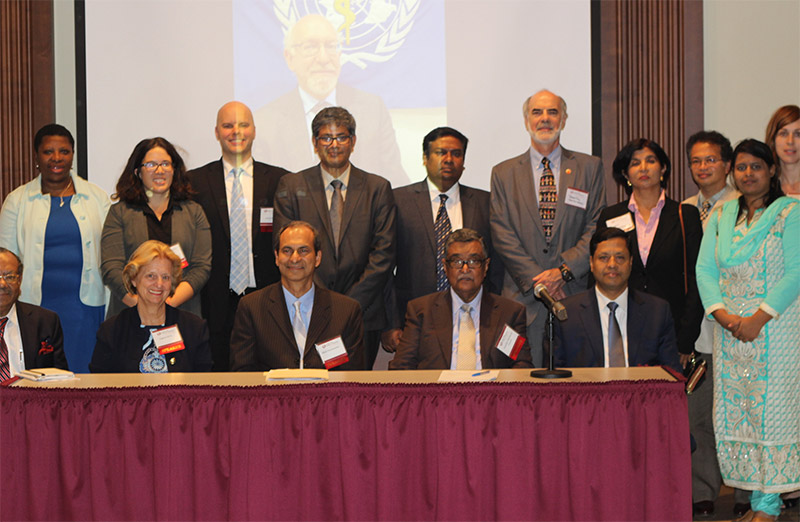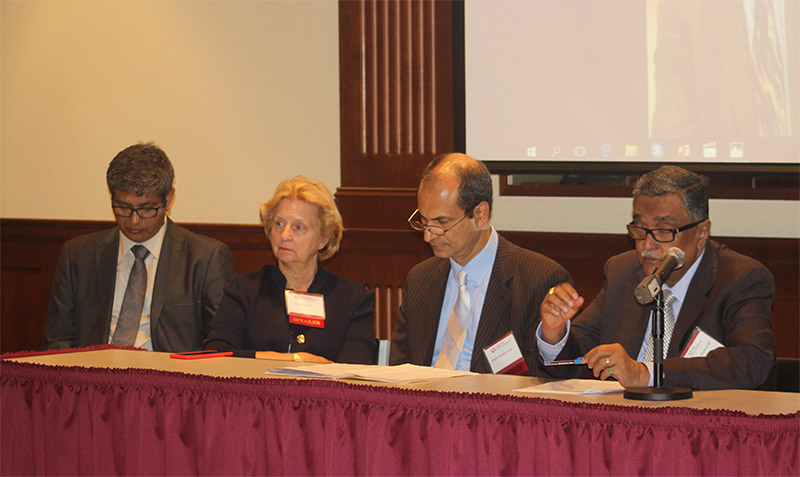The International Society of Urban Health (ISUH) and the participants representing more than 66 countries worldwide in the 12th International Conference on Urban Health 2015 (held May 24-27 in Dhaka, Bangladesh), call for recognition of urban health as a priority for sustainable development. It is important that the many links between the SDG health goal (#3) and urban goal (#11) be reflected in national work plans and in national and city-specific targets and indicators for implementing the post-2015 development agenda. In addition, in order to ensure the creation of urban conditions that promote health, the importance to human health of decisions on the many factors shaping the future of cities (eg built and natural environment, housing, transportation, and economic development, among others) must be acknowledged in The New Urban Agenda of Habitat III, the United Nations Conference on Housing and Sustainable Urban Development (October 2016). Thus in advance of the UN Summit to Adopt the post-2015 Development Agenda during 25-27 September 2015, The New York Academy of Medicine, The International Society for Urban Health, Bangladesh Urban Health Network and Eminence Associates for Social Development organized a meeting on Urban Health in Sustainable Development: Opportunities and Challenges on 24 September 2015 at the New York Academy of Medicine, New York, USA.

This meeting brought together stakeholders from the many disciplines and sectors affecting urban health to exchange knowledge, policies and practices that promote the health of individuals in urban areas and to consider the opportunities and challenges of the urban environment on health issues across the Sustainable Development Goals. The objectives of the meeting were to improve the shared knowledge among urbanists and health related professionals on the factors important in sustainable and healthy urbanization through discussion of experiences and best practices. Among the renowned professionals present in the meeting were Prof Jo Ivey Boufford, President, The New York Academy of Medicine, Dr. Md. Shamim Talukder, President, ISUH, Poonam Singh, Regional Director WHO South East Asia, Simon Bland, Director, New York Liaison Office, UNAIDS , Joshua Glasser, Foreign Affairs Officer, Office of International Health & Biodefense, Bureau of Oceans and International Environmental and Scientific Affairs, United States Department of State, Eugenie Birch, Lawrence C. Nussdorf Chair of Urban Research and Education, Penn Institute and Chair, World Urban Campaign , Nikhil Chandavarkar, Chief, Communications and Outreach Branch, Division for Sustainable Development, UNDESA, Johanna Ralston, CEO, World Heart Federation, Prof Dr. A F M Ruhal Haque, Chairman of the Parliamentary Standing Committee on Science and Technology, Member of the Parliamentary Standing Committee on Health and Family Welfare, Bangladesh, Mr. Abdul Malek, Secretary, Ministry of Local Government Rural Development and Cooperatives and Khandker Mosharraf Hossain, Honorable Minister, Ministry of Local Government Rural Development and Cooperatives, Government of the People’s Republic of Bangladesh.

The Key Note Paper presented by Dr. Poonam Singh focused on prioritizing urban health in the sustainable development goals. She added rapid urbanization has implication for inequities with lesser access to affordable services by the slum dwellers which leads to higher out of pocket expenditure. This region accounts for the largest amount of out of pocket expenditure even though the constitution of many of these countries mentions free health care. Thus it is important to make access to health services and facilities which will lead to healthy lifestyle. She also put up the example of the community clinic services of Bangladesh as a success story where the community participation ensures providing basic services to the people. She added this is the century for mayors and local government and they can play an important participatory role for strengthening participatory governance. Mr. Abdul Malek, Secretary, Ministry of Local Government Rural Development and Cooperatives mentioned that proactive approach to urban health will provide opportunities for both the public and private sector while working to mould our growing cities into sustainable, inclusive and healthy environments. Eugenie Birch, Lawrence C. Nussdorf Chair of Urban Research and Education, Penn Institute and Chair, World Urban Campaign mentioned that this is a very important time for the UN and development organizations and member states including the civil society organizations for making the most important decisions for the next 15 years. Nikhil Chandavarkar, Chief, Communications and Outreach Branch, Division for Sustainable Development, UNDESA mentioned that everything in the new agenda for the SDG is an urban challenge. He further added there needs strong advocacy for the inclusion of the urban health agenda into the Habitat III and also advocate through the relevant stakeholders to the high level political forum for including the urban health agendas since this forum would be a long term high stake forum for implementing the SDGs.H.E. Khandker Mosharraf Hossain, Honorable Minister, Ministry of Local Government Rural Development and Cooperatives mentioned that the rapid urbanization placed significant pressure on health services and facilities in urban areas. Honorable Minister added that Ministry of Local Government, Rural Development and Cooperatives in partnership with Eminence and United Nations University, Malaysia will be developing an Institute for Urban Development in Bangladesh which will contribute through research, capacity development and dissemination of knowledge about key human health and development issues to resolve the pressing global problems and address the sustainable development goals.








